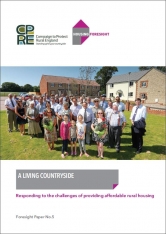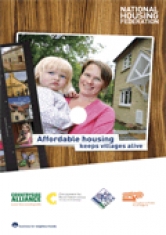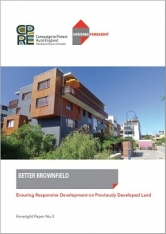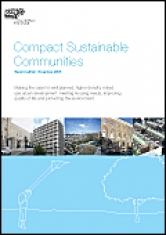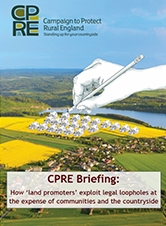Housing and planning
A Living Countryside
Responding to the challenges of providing affordable rural housing
The fifth paper in CPRE Housing Foresight series identifies a range of solutions to increase and sustain affordable housing in rural areas. These include better funding and guidance, incentives to identify suitable sites, and rural exemptions from national policies which restrict rural affordable housing.
Affordable Housing Keeps Villages Alive
This brochure considers the need for affordable housing in rural communities and how it can be built to best meet the needs of local people in the long term. Prepared by the National Housing Federation in conjunction with CPRE and other partners.
Better Brownfield
Ensuring Responsive Development on Previously Developed Land
CPRE's third Housing Foresight paper argues that large scale brownfield sites require a comprehensive approach to development which should adopt best practice from Europe.
It also considers the development of small-scale brownfield sites in England, finding that a register of these sites together with a flexible approach to space standards can make the most of their potential.
Brownfield comes first
Why brownfield development works
To investigate the extent to which brownfield is a viable option for development, CPRE commissioned construction analysts Glenigan to compare the speed of residential development on brownfield sites with development on greenfield, once these sites have been granted planning permission.
Building in a small island
Why we still need the brownfield first approach
This report responds to one of the potentially most far reaching changes proposed in the Government’s consultation draft National Planning Policy Framework. It examines the proposals to cease giving clear priority nationally to development on brownfield sites (formally called ‘previously developed land’) before greenfield. It also considers the implications of the related recent policy changes made by the Government to drop the minimum housing density range which has until recently been recommended as national policy.
Cambridge - Milton Keynes - Oxford: A Corridor of Uncertainty for the Countryside
A CPRE Briefing
The Government is set to accept a recommendation from the National Infrastructure Commission (NIC) to build 1 million new homes between Oxford, Milton Keynes and Cambridge.
NIC recommendations also include 1.1 million new jobs, the re-opening of a railway link (known as ‘East West Rail’) between Cambridge and Oxford, and a major new road called the ‘Oxford-Cambridge Expressway’.
CPRE is concerned about the way the Government has approached this issue, for three key reasons:
- There is a troubling democractic deficit around these plans, and there has been no formal public consultation on the NIC recommendations;
- There has been no formal Strategic Environmental Assessment (SEA) of the impact of the proposals for development in the Arc;
- There is a lack of vision for housing.
This briefing sets out what CPRE are calling for, which is:
- A full parliamentary inquiry into the proposals
- A proper planning process with local involvement
- An Arc-wide commitment to high standards of affordable housing provision and design
- Protection and improvement of the environment
- Improvements to public transport, not a new road
Compact Sustainable Communities
Making the case for well planned, higher density, mixed use urban development: meeting housing needs, improving quality of life and protecting the environment.
CPRE Briefing
How ‘land promoters’ exploit legal loopholes at the expense of communities and the countryside
This short briefing sheds some light onto how self-styled ‘land promoters’ make lucrative profits by exploiting the planning system and working against local wishes.
Land promoters persuade landowners to allow them to pursue planning permission on their land for a share in the profits once it is sold on for development.
Communities welcome good development that follows local and neighbourhood plans, but land promoters actively work against local wishes for the sake of their own profit. National planning policy allows and even encourages land promoters to do this through loopholes in the NPPF.
CPRE undertook analysis of appeal decisions concerning four land promoters, between 1 April 2012 and 31 August 2017. It shows that even in cases where local authorities had an up to date 5 year housing land supply, one in three cases are approved.
In the majority of these cases, land promoters sought to undermine authorities further by openly challenging authorities’ housing land supply. This, and other forms of speculative development, have lost communities’ faith in the planning system.
CPRE response to the Government's National Planning Policy Framework consultation
CPRE's full and summary response to the Government's National Planning Policy Framework consultation.
